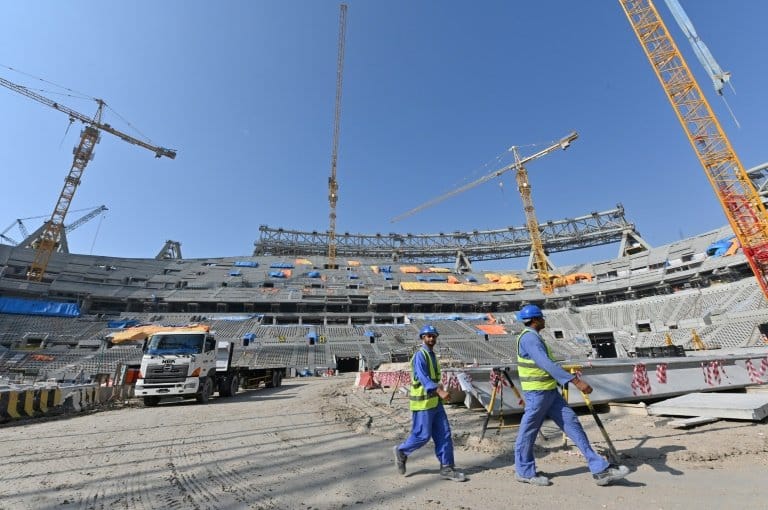Worker deaths take a toll on World Cup host Qatar

The number of worker deaths from Qatar’s giant World Cup campaign may never be known but the debate has already taken a toll on the Gulf state’s name, experts say.
One of the world’s wealthiest countries, Qatar has been transformed since FIFA awarded the tournament in 2010 with a new metro, skyscrapers, highways, new universities, museums and a port built alongside seven new stadiums and one rebuilt.
Rights groups and media reports say thousands of workers may have died on the huge construction sites. The government calls the claims “outrageous and offensive”, and says it is considering “legal” action to defend the country’s name.
Qatar, FIFA and the international unions who pressured the Gulf state say more focus should be put on the reforms it has pursued to improve safety, establish a minimum wage and give workers more rights to change jobs and even leave the country.
But with Qatar determined to pursue its modernisation, it faces pressure from the UN’s International Labour Organisation, unions and foreign governments to improve its data collection to end the controversy.
British newspaper, The Guardian, set off a major storm with a report in February 2021 that 6,500 workers from India, Bangladesh, Nepal, Pakistan and Sri Lanka died between 2011 and 2020. This was based on official figures from the countries.
Many other media have used this to say that 6,500 people died in World Cup stadiums, fuelling wild social media conspiracy theories.
The ILO, which has had an office in Doha since 2018, called the figures “misleading” and said they had been wrongly linked to World Cup sites without proper context.
The government says the figure takes the deaths of all foreign workers over the decade “and attributes it to the World Cup. This is not true”.
“This figure (6,500) has become iconic because it answers a question that no-one can answer,” said Jean-Baptiste Guegan, an academic and writer in France on international sports politics.
“One can also question, given the publicity that it has received, whether it has not been an instrument of a foreign strategy of influence.”
Other figures barely help the debate.
According to Qatar, there were 37 deaths of foreign workers linked to World Cup sites and only three in “work-related accidents”.
– ‘Stuck in minds’ –
An ILO report said there were 50 deaths and 500 serious injuries among foreign workers in 2020.
The UN agency said the figures could be under-reported because of data weaknesses.
But Max Tunon, head of the ILO office in Doha, told a recent seminar that the 6,500 figure was “extremely problematic” because “it is a figure that has stuck in people’s minds and people definitely attribute to the construction of World Cup stadiums.”
Highlighting a recent EU parliament debate on human rights, he added that the figure was affecting decision-making on Qatar.
“It was very evident that the policy makers, including the parliamentarians had very strong positions on Qatar based on what they had read in the media.
“It was not surprising to hear reference to the 6,500 figure, it wasn’t surprising to hear an assumption that two million migrant workers in the country are victims of forced labour. And it wasn’t surprising to hear that everybody associated everything in Qatar to the World Cup. In that sense it has had a concrete impact on policy makers.”
But the ILO is pressing Qatar to improve data collection as well as the implementation of its reforms.
Many deaths have just been blamed on “natural causes” and rights groups and others say this can hide too many work accidents.
“Because Qatar fails to adequately investigate the causes of workers’ deaths, it is very difficult to know exactly how many workers have died from working in Qatar’s extreme heat, but there is no doubt that the issue is extremely serious,” said Steve Cockburn, a senior researcher for Amnesty International.
“On World Cup and non-World Cup projects, thousands of deaths over the last decade remain unexplained, and at least hundreds of these are likely to have been related to unsafe working conditions,” added Cockburn.





